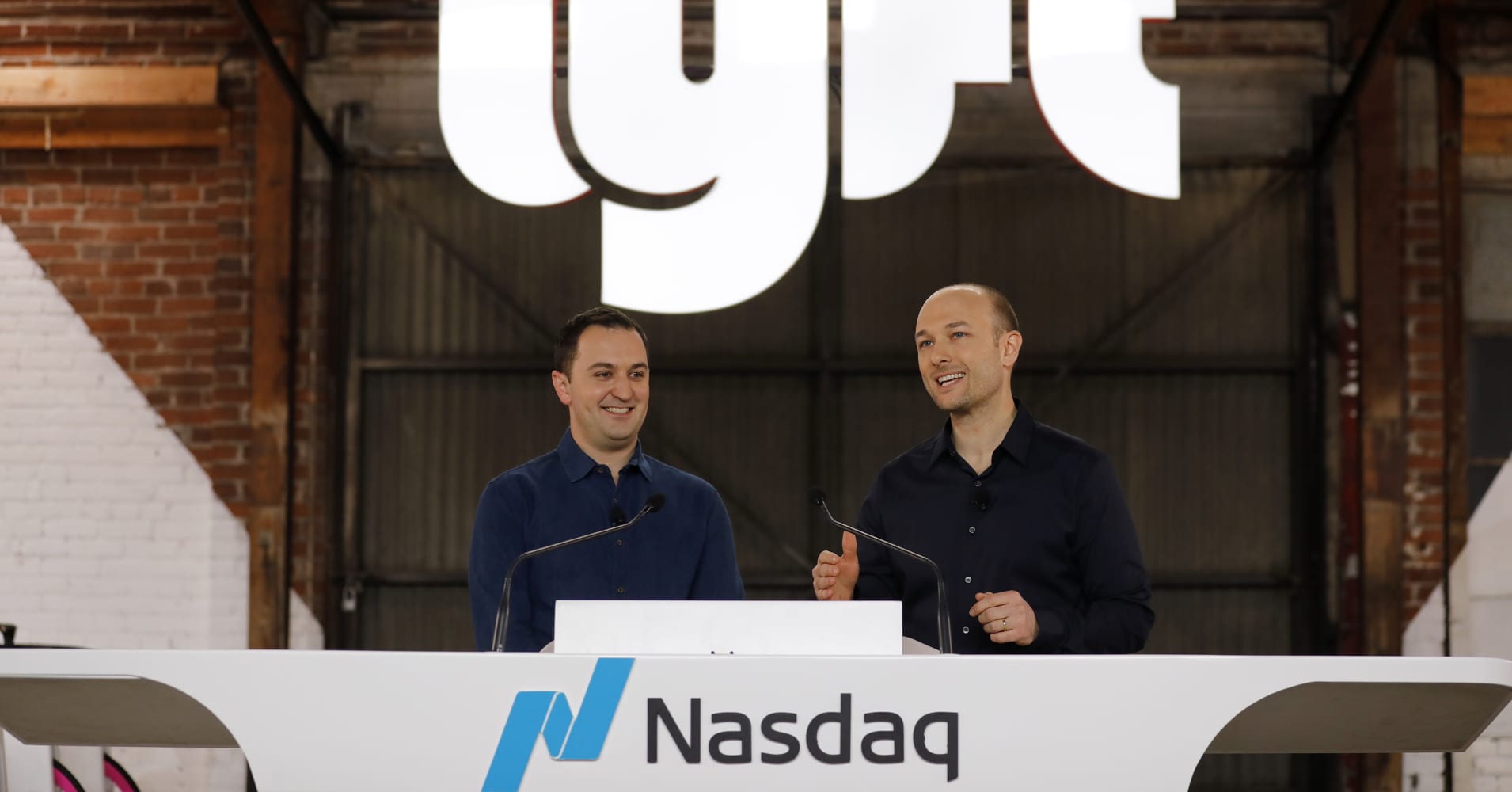
With their highly anticipated IPO today, Lyft is the first in a growing list of highly valued tech unicorns that have been eyeing the public market throughout the early part of 2019. On Friday the seven-year-old ride-hailing company went public at $87.24 a share with a valuation of $28 billion. It joins an exclusive club of disruptive companies — Airbnb, Uber, Slack and Pinterest — that have amassed huge sums of private capital with valuations never before seen on Wall Street.
As Lyft, Uber and other Silicon Valley companies have matured over the past decade, one of the many challenges they face has been how to manage a growing workforce of contract workers. Currently, Lyft has 1,600 full-time employees and 1.4 million contract drivers who have turned these side hustles into their full-time jobs. That large pool of independent contractors is expected to grow post-IPO, Lyft co-founders CEO Logan Green and president John Zimmer told CNBC's Andrew Ross Sorkin on "Squawk Box" Monday morning.
Now the debate on whether independent contractor status helps or hurts them has widened.
That's because they make an average of about $17.50 per hour and do not receive employee benefits. They're not eligible for overtime or a minimum hourly wage, and under federal law they don't have the right to unionize. Both Uber and Lyft have been under fire in the last few years for cutting their fares paid to drivers — most recently, an approximate 25 percent per-mile rate cut for Uber drivers.
Despite the efforts of these ride-sharing giants to put their best foot forward for potential investors, this past week alone saw contract drivers picketing over 2018 pay cuts outside a Lyft IPO roadshow event in San Francisco. But for these massive gig economy companies, protests and lawsuits over pay and labor practices are nothing new. Last year Uber agreed to pay a $20 million settlement over claims that drivers should be classified as employees, not contractors.
In a move aimed to compensate for the growing inequity,both ride-hailing companies recently announced different plans to offer their contract drivers variations of cash bonuses and stock options upon going public. Tim Sullivan, CEO of venture capital firm Oceanic Partners, said that the move shows a degree of goodwill despite his own skepticism that contractors who drive for either company will really benefit from their offerings in a significant way.
"As ride-sharing matures, they're going to ultimately have to pay drivers more," Sullivan said. "Otherwise, [the model] is not going to be sustainable." Lyft, a portfolio company of Sullivan's Oceanic Partners,claimed to hold 39 percent of the U.S. ride-sharing market at the end of 2018, making it one of the largest in the business segment only second to Uber. This, despite concerns about Lyft's profitability and the risk it continues to pose for the company following their public listing on Nasdaq. According to its S-1 filing, it lost $911 million in 2018.
Josh Felser, co-founder and early stage investor at Freestyle Capital, also believes that the move to introduce new benefits and incentives is meant to inspire contractor loyalty, but adds that he doesn't believe equity should be viewed as something that's owed to the contractor.
"Whether a contractor or an employee, I just think of everyone as a worker," he said. "Companies want their workers to be happy, and that's why Uber and Lyft are making this kind of offer. Happier workers means better service, and better service means happier customers, but nobody was under the illusion that equity as a benefit was part of the deal between contractors and Uber or Lyft."
But Felser still wants to see a path to full-time employment for contractors that work exorbitant hours to make the gig economy work for them full-time. "I do think there should be a path, but right now I think that path is really opaque," he said. "I do think the option to pursue said path should be given to the contractor, which will probably mean sacrificing some of the freedom that attracted them there in the first place," he added.
Though companies are unlikely to offer contractors the benefits of full-time employment anytime soon, there are a host of start-up companies such as Hyke and Catch out of Silicon Valley that are positioning themselves to answer the short-term call — tackling everything from payment of taxes to disability and health insurance.
And while it may seem like a Band-aid, it could correct the inequities in the modern gig economy as some of its pioneering companies make their billion dollar exists throughout the remainder of the year.
On a larger level, automation poses an even greater threat to the gig economy, despite the growing number of freelancers and independent contractors. And Felser said there will come a time where drivers and other contract laborers alike will have to find something else to do, despite this growth. "We're moving into a much more project-based, skills-based world," he said. "That's a natural maturing of the market."
As autonomous vehicles become more mainstream, questions about Uber and Lyft's position will continue to surface more frequently, though they have made investments in the increasingly competitive space. By contrast, companies like Tesla and Alphabet's Waymo have already staked their claim in self-driving technology.
via IFTTT
No comments:
Post a Comment